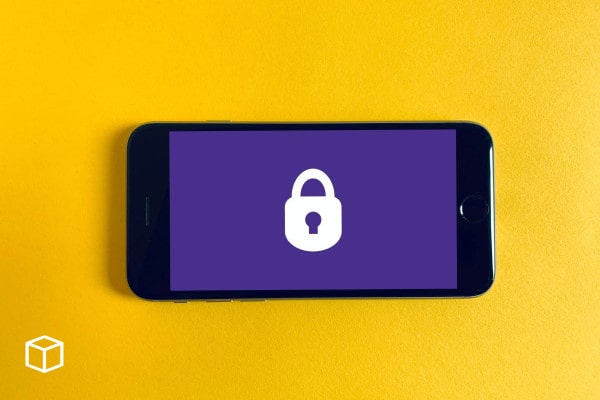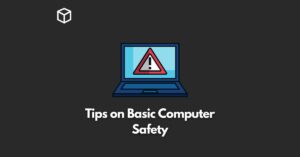Cyber security is a combination of defenses that can include using things like firewalls and antivirus software as well as any other steps taken to protect data as it’s transferred between devices.
In this article, you will learn about cyber security, how it works, scope and career in the cyber security field.
So let’s begin!
What is Cyber Security
Cyber security is a broad term, and can be understood as a set of tools and techniques designed to protect networks, computers, programs and data from unauthorized access by hackers, cyber criminals and others.
Although the Internet has existed since 1969, cybersecurity as we know it today didn’t exist until the early 1990s.
Security measures like firewalls and encryption were originally designed for network protection against an outside attack or hacking.

They were not initially intended to protect against inside threats such as disgruntled employees who might want to bring down a company’s servers.
But recognizing these threats has become crucial in recent years as more companies make sensitive data accessible on the web through cloud servers and bring computer systems closer together with mobile devices.
The Importance of Cyber Security
It is important to be aware of the risks and potential consequences that come with the use of technology.
We must be diligent to protect our computers, phones, and networks from malicious attacks which could result in compromised data or services. One of the most common types of cyber attacks includes phishing scams.
Cyber security helps us in protecting our online assets.
How Does Cybersecurity Work?
The best analogy for understanding cybersecurity is to think of what you do when you go online. You trust the website, right? And if it’s not secured correctly, someone could get your information or change your account.
People want to use computers and make them do things without being hacked by a stranger over the internet.
Cybersecurity protects people from hacking or being watched online so they can be private with their banking information, browsing habits, communications and social media posts etc.
It also helps people maintain control of networks so they can fight cyberattacks.
What are the benefits of cybersecurity?
Some of the benefits of using cyber security are:
- Protect your business from hackers.
- Ensure your data is safe and secure.
- Never worry about data loss or IP theft.
- Your customers wouldn’t do business with an insecure company that cannot guarantee their safety.
- Stay ahead of the game in today’s ever evolving technological world.
- Surpass the competition through tactical security knowledge and good practices.
- Be seen as a business that cares about their clients, making you more trustworthy in their eyes.
- Gain trust and credibility with your services.
- Give you a competitive advantage in the market, making you one step ahead of your competitors.
Types of cyber threats
There are many cyber threats – some of them are listed below:
1. Viruses- computer viruses are viruses that are transmitted through the internet and make copies of themselves. Viruses can destroy data, slow down your PC or even crash it. They are often spread through email attachments, websites or instant message programs.
2. Spyware – spyware is software that takes information about you without permission. It’s usually installed on your computer when you click on a link in an email or downloaded file, or when you visit a website that has hidden code that installs it without telling you. The information gathered by spyware can be used to commit fraud, identity theft or stalking online.
3. Malware – malware is another word for malicious software which includes computer viruses, worms, trojans etc. Malware can be used to steal personal details, spy on users and even damage devices.
4. DDoS – this stands for Distributed Denial of Service attack which is when a website or service is flooded with too many requests that it crashes the site until someone gives them attention or they lose interest. It is often used as an act of cyber terrorism or online warfare.
5. Hacking – hacking is when someone gains unauthorised access to your computer, data, passwords etc by exploiting security flaws in computer systems. Software bugs are usually responsible for these problems rather than people who find them and you can protect yourself against hackers by keeping your computer up to date with security patches.
6. Rootkits – rootkits are when someone takes control of your PC without you knowing and allows them to do anything they want to it. They use this access to collect personal information, install malware or delete files without you knowing. It is almost impossible for the average user to cure rootkits.
7. Bots – bots are when someone takes control of your PC without you knowing and allows them to do anything they want to it. They use this access to collect personal information, install malware or delete files without you knowing. It is almost impossible for the average user to cure rootkits.
8. Ransomware – this is a type of malware that restricts access to the computer system it infects and demands a ransom before allowing full access.
9. Keyloggers – keyloggers are used by hackers to observe the keys being struck on a keyboard with the aim of intercepting passwords, credit card numbers, personal information etc.
10. Phishing – this is where a hacker tries to trick you into giving out personal details by sending a message that looks as if it’s from an official source such as your bank or government department. To protect yourself, never give any personal information through email and always look for spelling mistakes on official websites. For example, “secure” is a misspelled word on this official phishing website.
11. Clickjacking – clickjacking is where victims are tricked into clicking links that look harmless but will actually lead to them being hacked or have their information stolen by malicious software. It happens when hackers use carefully hidden hyperlinks on an otherwise trusted site to trick people into giving up private information.
12. Social engineering – this is when hackers use personal information to gain access to your PC or programs that they need in order to commit fraud etc. It’s often done by email and can be very difficult for users to detect as it comes from a trusted source such as your bank, local council etc.
13. Botnets – these are networks of computers that have been taken over without the owner’s knowledge and used to send spam emails, commit fraud or launch DDoS attacks. They can be made up of hundreds of thousands of computers which makes them very difficult to track down.
14. Password cracking – password cracking is when hackers gain access to your computer by trying to guess your password. They do this by using software that automatically tests words and phrases until it gets the right one. If you use a strong password made up of letters, numbers and symbols then it’ll take them much longer to crack it.
15. Trojan – A Trojan Horse (named after the famous Trojan War) is malware that appears to perform a desirable function for the user prior to installation, such as a free screensaver or an online game generator. In reality however, it performs some other function, such as stealing passwords or making the system unreliable.
Best Cyber Safety Tips
- Practice good cyber hygiene.
- Keep web browsers updated.
- Stay aware of phishing scams and malware attacks.
- Use strong passwords, don’t share personal information, use two-factor authentication when available to do so.
- Regularly update antivirus programs on computers and smartphones.
- Use a VPN
- Stay informed about data security issues.
- Report suspicious activity to your bank and local authorities.
- Educate yourself about the risks involved with doing business online.
Types of Cyber Security
Here are some the different types of cyber security:
- Antivirus: This type of security is used for stopping worms from spreading to the computer. Antivirus software scans through archival documents, downloads, or email attachments. It also checks online traffic and downloads in the computer to make sure that there are no malwares.
- Firewall: The firewall is a hardware or a software program which prevents outside access to the server. It filters data going in and out of the server and typically sets up a “default deny” rule for anything not explicitly allowed. Firewalls are used to protect one network from another network on the internet, or separate servers on an internal network so that they cannot interact with each other directly.

- Software Patch Management: This is the process of applying security patches to software. Patches are most commonly issued in response to bugs found after release, but patches hit some discontinuity in the development cycle too.
- Router Security: A router is a networking device that forwards data packets between computer networks. Routers perform routing, filtering, and forwarding of full messages sent through the LANs connected to them.
- Printer Security: A printer is an output device which takes data in electronic form and produces a visible image on paper. Printer security deals with protection of printers, their users, and networks connected to them, from external attacks aimed at disabling the service or stealing documents printed by that printer. It may also authenticate users but authentication is a separate issue.
- Spam filtering: Spam or spamming is the use of electronic messaging systems to send unsolicited messages.
- Data Encryption: Data encryption is a method for protecting information, using an algorithm to transform information into a form, called ciphertext, that cannot be easily understood by unauthorized people if the information is intercepted during transmission.
- Database Security: Information security or Information Assurance (IA) includes all of the policies, strategies, actions, techniques, and technologies that are used to protect data collected for business purposes against accidental or intentional manipulation, loss or release without permission.
- Wireless Network Security: Wireless network security is a broad term that covers many different areas to help protect wireless computer networks, users, and data. These areas include authentication, access control, encryption when transferring data across wireless devices.
- Security Awareness: Security awareness is a working knowledge of security issues and vulnerabilities that includes familiarity with applicable security policies, procedures and regulations. Security awareness seeks to change how workers behave, decreasing the likelihood that they will accidentally or carelessly introduce system and data degradations (and their associated costs).
- WiFi Security: WiFi security is a set of solutions that should be deployed in today’s wireless networks to provide protection against potential attackers. These include authentication protocols, encryption, service set identifiers (SSIDs), among others.
Cyber Security vs Information Security
Cybersecurity is a term that describes the protection of IT systems from cyberattacks. A good way to think about cybersecurity is to picture a castle with its defenses. Cybersecurity is all of the things you do to keep out the bad guys and keep in the good guys.
Information security, on the other hand, is all of the things you do to protect sensitive data from being seen or used by unauthorized people.
Cyber security checklist
- Do not answer email from unknown senders.
- Install password management software to manage passwords.
- Check your account for recent logins that were not by you.
- Change passwords often, make sure to use different types of characters in your password.
- Do not use the same password for every service.
- Use email to receive messages from unknown senders.
How to get into Cyber Security?
Cyber security is a career that is growing rapidly because of the need for internet protection. Here are the steps you need to take to ensure that you are well prepared to enter the cyber security industry:
1. Sign up for cyber security courses – There are plenty of universities and colleges that offer classes specifically about the topic of cyber-security. Cyber-security courses are offered online as well as on campus which means that there will be options available no matter where you live or want to go to school.
2. Apply for internships – Internships are a great way to learn more about what it’s really like inside an organization while getting hands-on experience. Companies are usually on the lookout for interns who they can train up to see if they like their company and if they fit well with the organization’s culture.
3. Develop your communication skills – Cyber security is more than just technology, but also communication. What makes cyber security different from other IT specialties is that it combines technology with people. Because of this, cyber security professionals need to have strong communication skills so they can tell the business what exactly the risks are and how to best protect themselves.
4. Get to know your hardware – Cyber security professionals need to understand every aspect of their computer systems including firmware, memory components, I/O controllers, and processor architecture. This is how cyber security professionals are able to create the best protection for their systems because they know exactly what they’re up against.
5. Learn about cryptography – Cryptography is used throughout the industry to make sure that sensitive data stays readable only to authorized users. Without cryptography, cyber security professionals wouldn’t be able to get the protection they need for systems.
6. Practice your Skills – The internet is a vast space that continues to grow and change every single day. It is important that cyber security professionals practice in order to stay on top of protecting against new threats. There are plenty of online resources where cyber security professionals can hone their skills in order to best protect against threats.
Following the steps above will ensure you are prepared to enter the cyber security industry successfully.
How much does Cyber Security pay?
Cyber security has become one of the hottest industries in terms of compensation packages lately. Cyber security companies are struggling to find employees with an adequate amount of experience when it comes to their industry.

On average worldwide entry-level cyber security specialists make anywhere from $50,000-$70,000 USD per year. If you are already employed in this industry and have some experience under your belt then you can expect to make anywhere from $100,000-$125,000 USD per year. Anyone who becomes a senior cyber security specialist can make $150,000 or more depending on their experience level.
How to become a Cyber Security Analyst?
Some of the requirements to become a cyber security analyst are that you should have educational training, extensive IT knowledge, and keen analytical skills.
And if someone is looking for an entry level cyber security analyst job, they should have completed a bachelor’s degree in computer science, software engineering or IT with relevant work experience.
What does a Cyber Security Analyst do?
A cyber security analyst is responsible for using their technical expertise to identify, classify, and prevent unauthorized intrusions into computer systems.
The job of a cyber security analyst includes understanding the common types of attacks as well as developing policies that can be used to thwart such intrusions.
The job of a cyber security analyst is very important in that they are the first line of defense when it comes to protecting sensitive financial, business and personal client data.
How to become a Cyber Security Engineer?
To become a cyber security engineer you will need to learn how to use the different types of software that they use for this type of work.
You will also have to be able to have a good understanding of computer languages and programming languages. You will also have to study mathematics, physics, and information technology if you want to become a cyber security engineer.
You will also need to know the different types of devices that are used in cyber security . You will need to learn how these work and what they do.
Some of the more common devices are firewalls, access control systems, cryptography appliances, intrusion detection systems, digital forensics analysis software , IDS/IPS sensors, network perimeters, data leakage prevention , and virtual private networks.
How to start a Cyber Security Company?
If you have worked in the IT industry for some time now and have been thinking about starting your own business but don’t know how, this could be the perfect opportunity for you.
Before you get started, make sure that this is something you are passionate about. If you aren’t interested in cyber security, it will be difficult to market your product or service to customers and convince them to purchase it.
You also need to network with people to let them know about your company’s products because there is no better way to advertise than through word of mouth.
If you have the technical wherewithal to develop cybersecurity products, this is a great market for you. It’s expected to grow exponentially over the next few years so there is plenty of room for new companies in the field.
This means that competition will be strong but if your product or service is better than your competitors, you will be in high demand.
If you’re thinking about starting a cyber security company, remember to develop a solid security plan. This is integral for the success of your business so take your time and get it right from the start.
You also need to market yourself well so customers know what’s available to them. If you have the enthusiasm for this type of industry, then go ahead and get started.
What are the career opportunities in cybersecurity?
Some of the cybersecurity roles include:
- Cyber Security Analyst;
- Cyber Security Architect;
- Cyber Security Engineer, and
- Cyber Security Manager.
The Cybersecurity Analyst job role is to design and implement the security of a network. They also use their analytical skills to solve problems and find loopholes in security systems.
They must be able to develop and maintain the IT infrastructure through the documentation of system designs and practices.
The Cyber Security Architect position is managing network security issues that involve an entire enterprise or major parts of it. They manage BIA, risk assessment, and compliance efforts for those networks. They also develop and make changes to the standardized security policies used by the organization and decide how those policies will be implemented.
The Cyber Security Engineer job role is responsible for managing, maintaining, and implementing technical solutions to protect data while preserving availability and integrity. The cyber security engineer designs and implements IT infrastructure that adheres to the standards set forth by the CIS Critical Security Controls.
The Cyber Security Manager job role plans, organizes and coordinates all cybersecurity efforts of an organization. The cyber security manager will oversee the implementation of the IT infrastructure which must adhere to standards and policies that keep data secure while maintaining its availability and integrity.
What is spear phishing in cyber security?
Impersonating an acquaintance in an e-mail with the intent to extract information, buying stolen credit card numbers, or account numbers.
The attachments are often disguised as coming from someone the victim knows, like a friend or co-worker. These emails often contain some persuading information, such as an urgent problem, which encourages them to download the attachment.
You Might Also Like
- What is a Domain Name and how does it work?
- What is Big Data and how does it work?
- What is Google Cloud Platform?
- What is Internet of Things and how it works?
- What is VoIP and how does it work?
- What is API and how does it work?
- What is Coding and how does it work?
- What is a Payment Gateway and how does it work?
- What is a Router and how does it work?
- What is Cloud Computing and how does it work?





